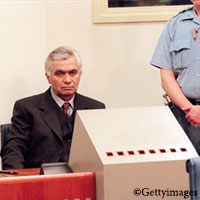
 After capturing Žepa in late July 1995 approximately 800 Bosniaks from Žepa crossed the River Drina and entered the territory of the Republic of Serbia, frightened for their lives after rumours had spread of the crimes committed by the Army of Republika Srpska in Srebrenica. Most of them were members of the Army of BiH, but there were also civilians, including dozens of underage boys. Almost immediately after crossing, the men were taken captive by border guards of the Yugoslav Army and members of Special Police Units.
After capturing Žepa in late July 1995 approximately 800 Bosniaks from Žepa crossed the River Drina and entered the territory of the Republic of Serbia, frightened for their lives after rumours had spread of the crimes committed by the Army of Republika Srpska in Srebrenica. Most of them were members of the Army of BiH, but there were also civilians, including dozens of underage boys. Almost immediately after crossing, the men were taken captive by border guards of the Yugoslav Army and members of Special Police Units.
After registration and interrogation, accompanied by ill-treatment, all detainees were taken to the Šljivovica camp in Braneško Polje, near Čajetina. As there was no room in Šljivovica for such a large number of people, a group of detainees was transferred to another camp, located in Mitrovo Polje (Aleksandrovac municipality). In both camps, detainees were subjected to torture, sexual violence, inhumane treatment, humiliation and starvation, and were robbed of their possessions. Three detainees died as a result of the torture.
The Mitrovo Polje camp was closed in February 1996. The camp in Šljivovica was closed in April 1996, when the last remaining detainees were freed.
To date, no one has been called to account for the torture, abuse and deaths of Žepa male detainees in the camps in Serbia. Although the names are known of the inspectors and guards who were in the camps, no proceedings have ever been brought before any domestic court to establish the criminal responsibility of these individuals for acting contrary to domestic and international law. Neither the International Criminal Tribunal for the former Yugoslavia nor the International Court of Justice has addressed the torture of the Bosniaks in Serbian camps, although both courts were presented with evidence concerning these crimes.
The dossier „Šljivovica and Mitrovo Polje“ is available here.

 With regard to the announced appearance of a war criminal, Veselin Šljivančanin, at a Serbian Progressive Party rally, civil society organizations demand that the ruling political parties stop putting the match to nationalism as electoral fuel, and establish responsibility for preserving and improving peace in the region as their first priority.
With regard to the announced appearance of a war criminal, Veselin Šljivančanin, at a Serbian Progressive Party rally, civil society organizations demand that the ruling political parties stop putting the match to nationalism as electoral fuel, and establish responsibility for preserving and improving peace in the region as their first priority.







 The Office of Tomislav Nikolić
The Office of Tomislav Nikolić 



 The Administration Committee of the National Assembly of Serbia has proposed Danica Marinković, a former investigative judge of the Priština District Court at the time of the war in Kosovo, as a candidate for the position of Member of the Board of the Anti-Corruption Agency. The National Assembly will be deciding on the election of the candidate in an urgent procedure. Human rights organizations underline that there is ample evidence available to the public, already presented in
The Administration Committee of the National Assembly of Serbia has proposed Danica Marinković, a former investigative judge of the Priština District Court at the time of the war in Kosovo, as a candidate for the position of Member of the Board of the Anti-Corruption Agency. The National Assembly will be deciding on the election of the candidate in an urgent procedure. Human rights organizations underline that there is ample evidence available to the public, already presented in 
 After capturing Žepa in late July 1995 approximately 800 Bosniaks from Žepa crossed the River Drina and entered the territory of the Republic of Serbia, frightened for their lives after rumours had spread of the crimes committed by the Army of Republika Srpska in Srebrenica. Most of them were members of the Army of BiH, but there were also civilians, including dozens of underage boys. Almost immediately after crossing, the men were taken captive by border guards of the Yugoslav Army and members of Special Police Units.
After capturing Žepa in late July 1995 approximately 800 Bosniaks from Žepa crossed the River Drina and entered the territory of the Republic of Serbia, frightened for their lives after rumours had spread of the crimes committed by the Army of Republika Srpska in Srebrenica. Most of them were members of the Army of BiH, but there were also civilians, including dozens of underage boys. Almost immediately after crossing, the men were taken captive by border guards of the Yugoslav Army and members of Special Police Units.